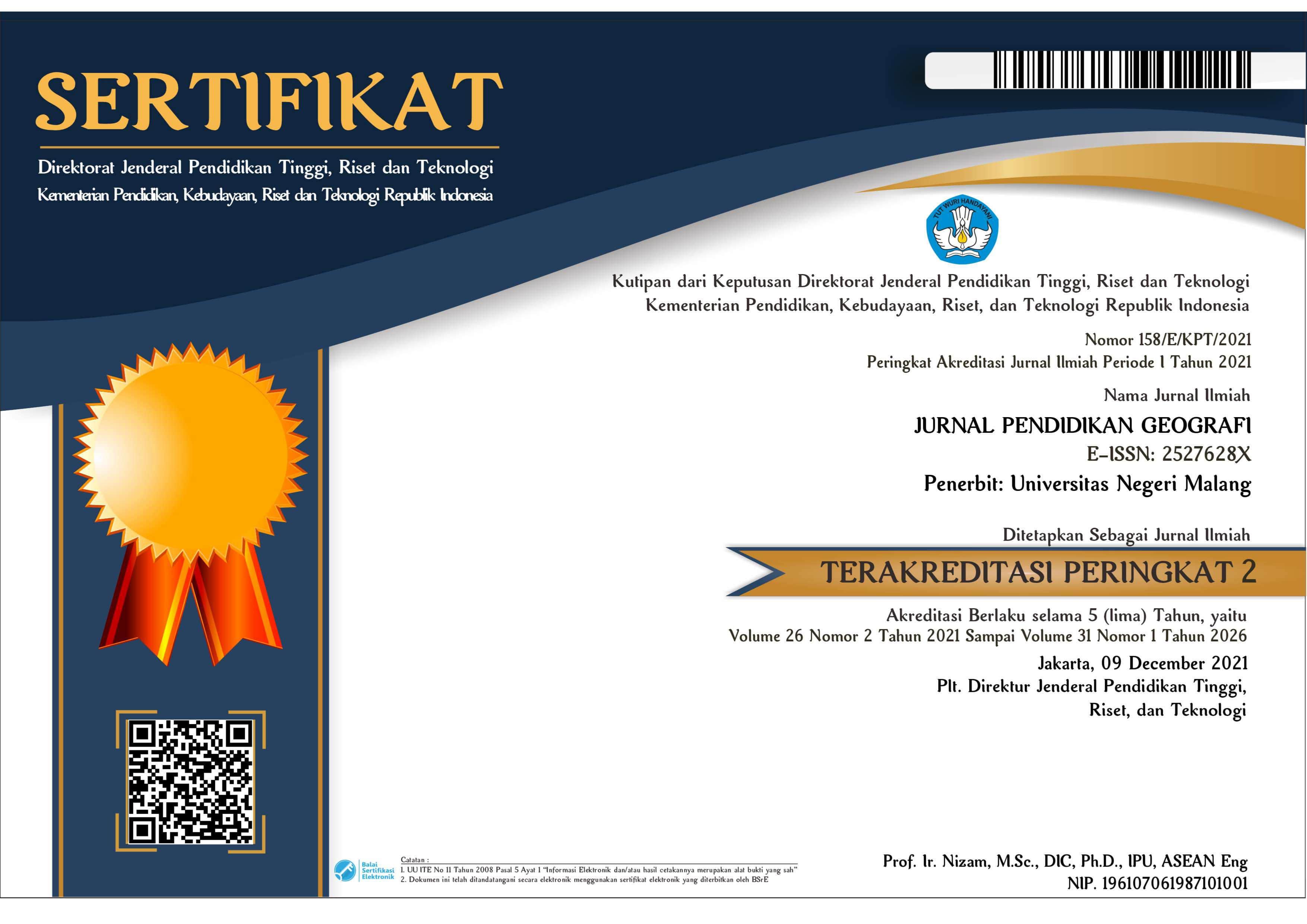Economic and environmental benefit of informal waste scavenging at landfill sites: A case study at Bukit Gemuk, Tawau, Sabah, Malaysia
Abstract
Recycling is an important part of the solid waste management system. However, community engagement in this activity remains relatively low. The presence of a group of individuals engaged in collecting recyclable materials at landfill sites has contributed to improving solid waste management performance. This paper aims to identify the background and activities of scavengers in collecting recyclable items at landfills, as well as the environmental impact of the scavenging activity. This study was based on questionnaires distributed to 46 scavengers in the study area. The Life Cycle Assessment (LCA) method was used to assess the environmental impact of using recyclable materials in manufacturing products. The LCA analysis could identify the contribution of recycled materials to the total savings of carbon dioxide (CO2), methane (CH4), and nitrogen dioxide (N20) by using recycled materials in the production of a new product. According to the study, the majority of those involved in the scavenging activity are immigrants from Indonesia and the Philippines. Despite safety and health concerns, their efforts to earn a living through waste scavenging are extremely valuable. Furthermore, the findings show that their contribution to the collection of recyclable materials cannot be denied. It is because the presence of this group is essential in a country where recycling awareness is low. Furthermore, the indirect contribution to the environment is important, particularly in reducing the use of natural materials in producing new materials. As a result, the government must devise a more effective strategy for recycling programs by involving all stakeholders.
Keywords
Full Text:
PDFReferences
Agunwamba, J. C. (2003). Analysis of scavengers’ activities and recycling in some cities of Nigeria. Environmental Management, 32, 116–127.
Asim, M., Batool, S. A., & Chaudhry, M. N. (2012). Scavengers and their role in the recycling of waste in Southwestern Lahore. Resources, Conservation and Recycling, 58, 152–162.
Asis, A. K. B., Mapa, M. T. B., Suwardi, R., & Antie, N. (2013). Isu kesihatan dan keselamatan di kalangan scavengers: Tinjauan awal di Tapak Pelupusan Sampah Kayu Madang, Bandaraya Kota Kinabalu, Sabah, Malaysia. Prosiding The 3rd International Conference Urban Mobility: Its Impacts on Socio-Cultural and Health, 292–303. Surabaya, Indonesia: Fakultas Ilmu Budaya Universitas Airlangga.
Bogner, J., Pipatti, R., Hashimoto, S., Diaz, C., Mareckova, K., Diaz, L., … Gao, Q. (2008). Mitigation of global greenhouse gas emissions from waste: conclusions and strategies from the Intergovernmental Panel on Climate Change (IPCC) Fourth Assessment Report. Working Group III (Mitigation). Waste Management & Research, 26(1), 11–32.
Bolton, K., & Rousta, K. (2019). Solid waste management toward zero landfill: A Swedish model. In Sustainable resource recovery and zero waste approaches (pp. 53–63). Elsevier.
Cudjoe, D., Zhu, B., Nketiah, E., Wang, H., Chen, W., & Qianqian, Y. (2021). The potential energy and environmental benefits of global recyclable resources. Science of the Total Environment, 798, 149258.
Demetrious, A., & Crossin, E. (2019). Life cycle assessment of paper and plastic packaging waste in landfill, incineration, and gasification-pyrolysis. Journal of Material Cycles and Waste Management, 21, 850–860.
Diaz, R., & Warith, M. (2006). Life-cycle assessment of municipal solid wastes: Development of the WASTED model. Waste Management, 26(8), 886–901.
DOSM. (2019). Penduduk & Demografi. Malaysia: Department of Statistic of Malaysia. Retrieved from https://www.dosm.gov.my/v1/index.php?r=column/ctwoByCat&parent_id=115&menu_id=L0pheU43NWJwRWVSZklWdzQ4TlhUUT09
Economy Planning Unit. (2015). RMK 11 2016-2020. Kuala Lumpur, Malaysia: Percetakan Nasional Malaysia Berhad. Retrieved from https://www.moh.gov.my/moh/resources/RMK11/Buku_RMKe-11.pdf
Ezeah, C., Fazakerley, J. A., & Roberts, C. L. (2013). Emerging trends in informal sector recycling in developing and transition countries. Waste Management, 33(11), 2509–2519.
Hodal, K. (2017). Living off the landfill: Indonesia’s resident scavengers. Retrieved from The Guardian website: https://www.theguardian.com/world/2011/sep/27/indonesia-waste-tip-scavengers
Ibrahim, M. S., Saidu, A. A., Abubakar, A. J., Aliyu, F., & Adamu, A. (2022). Waste scavenging as a tool for poverty reduction among unemployed youths in Bauchi Metropolis, Nigeria. African Journal of Management and Business Research, 4(1), 136–156.
Kamran, A., Chaudhry, M. N., & Batool, S. A. (2015). Role of the informal sector in recycling waste in Eastern Lahore. Polish Journal of Environmental Studies, 24(2), 537–543.
Kassim, J. (2006). Kajian penjanaan dan komposisi sisa pepejal di kawasan luar bandar: Kajian kes Kampung Perpat Darat, Rengit, Batu Pahat, Johor. Universiti Teknologi Malaysia.
Katusiimeh, M. W., Burger, K., & Mol, A. P. J. (2013). Informal waste collection and its co-existence with the formal waste sector: The case of Kampala, Uganda. Habitat International, 38(1), 1–9.
Kimbugwe, E., & Ibitayo, O. O. (2014). Analysis of characteristics, activities, and exposure to vermin of human landfill scavengers in a developing nation. Environment Systems and Decisions, 34, 358–365.
Lawrence, K., Cooper, V., & Kissoon, P. (2020). Sustaining voluntary recycling programmes in a country transitioning to an integrated solid waste management system. Journal of Environmental Management, 257, 109966.
Mapa, M. T. B. (2007). Sustainable waste management in Malaysia: A case study of recycling in Kota Kinabalu, Sabah. University of East Anglia.
Mapa, M. T. B. (2017). Pengurusan sisa pejal mapan: Penelitian keatas Dewan Bandaraya Kota Kinabalu. In M. T. B Mapa, U. Imang, & M. A. Talib (Eds.), Isu-isu alam sekitar dan manusia di Sabah. Kajian dari sudut pandangan Geografi (pp. 182–200). Penerbit Universiti Pendidikan Sultan Idris.
Mapa, M. T. B., Powell, J. C., Asis, A. H. B., Sakke, N., & Gulasan, A. (2019). Waste scavenging and its contribution for survival and urban recycling in Kota Kinabalu City, Sabah, Malaysia. The Indonesian Journal of Geography, 51(2), 183–189.
Mapa, M. T. B., Sakke, N., Gulasan, A., & Asis, A. H. B. (2016). Golongan pengumpul bahan boleh kitar: Sumbangan kepada sosio ekonomi kelarga dan pengurusan sisa di Bandar Kecil (Lahad Datu). International Conference on Social and Economic Development (ICSED), 883–893. Terengganu, Malaysia: Universiti Malaysia Terengganu.
McDougall, F. R., White, P. R., Franke, M., & Hindle, P. (2008). Integrated solid waste management: A life cycle inventory. John Wiley & Sons.
Medina, M. (2000). Scavenger cooperatives in Asia and Latin America. Resources, Conservation and Recycling, 31(1), 51–69.
Moh, Y. (2017). Solid waste management transformation and future challenges of source separation and recycling practice in Malaysia. Resources, Conservation and Recycling, 116, 1–14.
Mohamad, Z. F., & Keng, J. (2019). Sustainable waste management in Malaysia: Opportunities and challenges. Malaysian Investment Development Authority (MIDA), 1–14.
Nzeadibe, T. C. (2009). Solid waste reforms and informal recycling in Enugu urban area, Nigeria. Habitat International, 33(1), 93–99.
Oguntoyinbo, O. O. (2012). Informal waste management system in Nigeria and barriers to an inclusive modern waste management system: A review. Public Health, 126(5), 441–447.
Oteng‐Ababio, M. (2012). The role of the informal sector in solid waste management in the GAMA, Ghana: Challenges and opportunities. Tijdschrift Voor Economische En Sociale Geografie, 103(4), 412–425.
Rockson, G. N. K., Kemausuor, F., Seassey, R., & Yanful, E. (2013). Activities of scavengers and itinerant buyers in Greater Accra, Ghana. Habitat International, 39, 148–155.
van der Hulst, M. K., Ottenbros, A. B., van der Drift, B., Ferjan, Š., van Harmelen, T., Schwarz, A. E., … Hauck, M. (2022). Greenhouse gas benefits from direct chemical recycling of mixed plastic waste. Resources, Conservation and Recycling, 186, 106582.
Vaverková, M. D., Adamcová, D., Zloch, J., Radziemska, M., Boas Berg, A., Voběrková, S., & Maxianová, A. (2018). Impact of municipal solid waste landfill on environment–a case study. Journal of Ecological Engineering, 19(4), 55–68.
Wanichpongpan, W., & Gheewala, S. H. (2007). Life cycle assessment as a decision support tool for landfill gas-to energy projects. Journal of Cleaner Production, 15(18), 1819–1826.
Wee, S. T. (2004). Pengurusan sisa pepejal di Malaysia. Jurnal Sains Sosial, 2(1), 9–25.
Wilson, D. C., Velis, C., & Cheeseman, C. (2006). Role of informal sector recycling in waste management in developing countries. Habitat International, 30(4), 797–808.
DOI: http://dx.doi.org/10.17977/um017v28i22023p168-177
Refbacks
- There are currently no refbacks.
Copyright (c) 2023 Jurnal Pendidikan Geografi: Kajian, Teori, dan Praktek dalam Bidang Pendidikan dan Ilmu Geografi

This work is licensed under a Creative Commons Attribution-ShareAlike 4.0 International License.
Jurnal Pendidikan Geografi: Kajian, Teori, dan Praktek dalam Bidang Pendidikan dan Ilmu Geografi is licensed under Creative Commons Attribution-ShareAlike 4.0 International License,
JPG Indexed By:
View My Stats









12.png)
